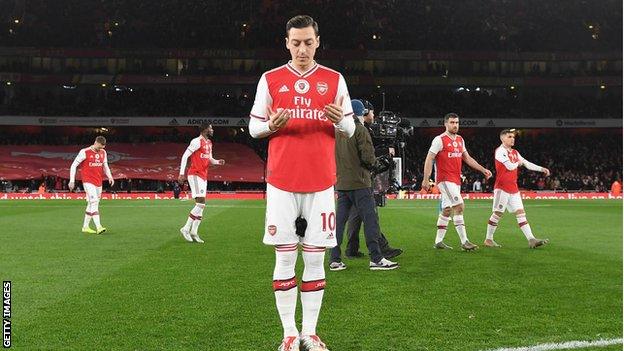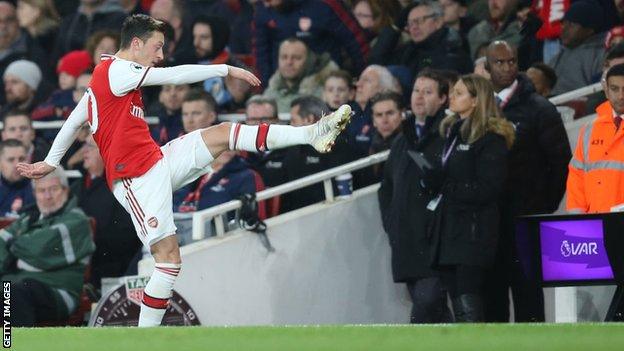Mesut Ozil: Arsenal midfielder 'deceived by fake news', says China
- Published

Mesut Ozil, who is a Muslim, prays before Arsenal's game against Manchester City on Sunday
Arsenal's Mesut Ozil was "deceived by fake news" before criticising China's treatment of Uighur Muslims, says the country's foreign ministry spokesman.
Ozil, who is a Muslim, called Uighurs "warriors who resist persecution" in a post on social media and criticised both China and the silence of Muslims in response.
But Geng Shuang said the German midfielder, 31, has been "influenced by untruthful remarks" and invited him to visit the autonomous Xinjiang region and "have a look" for himself.
Rights groups say about a million people - mostly from the Muslim Uighur community - are thought to have been detained without trial in high-security prison camps.
China has consistently denied mistreating Uighur Muslims in the country and says they are being educated in "vocational training centres" to combat violent religious extremism.
Following Ozil's comments, China's state broadcaster CCTV removed Arsenal's Premier League match against Manchester City from its schedule.
The 2014 World Cup winner's fan club on Chinese search engine Baidu has been removed by its founder, who said in a statement: "In front of national interest, any individual hobby doesn't matter any more."
On social media website Weibo, Ozil's account, which has four million followers, was still there on Monday, but there has been no update since 11 December.
Geng said: "I don't know if Mr Ozil has been to Xinjiang himself - but it seems he has been deceived by fake news, and that his judgment was influenced by untruthful remarks.
"If Mr Ozil has the opportunity, we will be pleased to see him go to Xinjiang and have a look."
What do we know about China's treatment of Uighurs?
The Uighurs are a mostly Muslim minority group, about 11 million of whom live in western China's Xinjiang region.
China has been widely accused of detaining Uighurs without trial in a network of high-security prison camps, where they are made to learn Mandarin Chinese, swear loyalty to President Xi Jinping, and criticise or renounce their faith.
China's claims that the camps are for voluntary "re-education" purposes have been undermined by leaked official documents, seen by BBC Panorama, that detail how inmates are locked up, indoctrinated and punished.
Instructions in the documents call for the camps to be run as high-security prisons with no escapes, and say detainees are awarded points for their "ideological transformation, study and training, and compliance with discipline".
Former prisoners have told the BBC of physical and psychological torture they allegedly suffered.

Ozil kicked his glove into the air after being substituted in Arsenal's loss to Manchester City
The Global Times described, external Ozil's comments as "false" and claimed he had "disappointed" football authorities.
The Chinese Football Association said his comments were "unacceptable" and had "hurt the feelings" of Chinese fans.
On Saturday, Arsenal distanced the club from the German's views, saying it was "always apolitical as an organisation".
Ozil played in the Gunners' 3-0 home defeat by Manchester City on Sunday. He reacted angrily to being substituted and he was booed by his own fans as he walked off the pitch at Emirates Stadium.
Analysis
Celia Hatton, Asia Pacific editor, BBC World Service
Beijing's decision to pull the Arsenal game from Chinese state television is the latest extension of a well-used method in China's playbook.
Back in 2010, the target was Norway: China cut many of its ties with Oslo after the Norwegian Nobel committee awarded the Peace prize to Chinese dissident writer Liu Xiaobo. Imports of Norwegian salmon to China were stopped, among other things.
In 2017, South Korea angered China by implementing a missile radar system that Beijing said would allow Seoul to spy into its territory. Beijing responded by stopping China tour groups from visiting South Korea, leading tourist numbers to plunge.
But this time, Beijing is playing with fire. Ordinary Chinese people might not notice or care if their choice of salmon is limited or they aren't encouraged to travel to a particular country, but they WILL notice if their most popular pro sports are pulled from Chinese television.
Chinese basketball is no replacement for missing NBA games and Chinese football is often ridiculed by sports fans in China. The country's bid to censor comments outside of its borders could backfire.